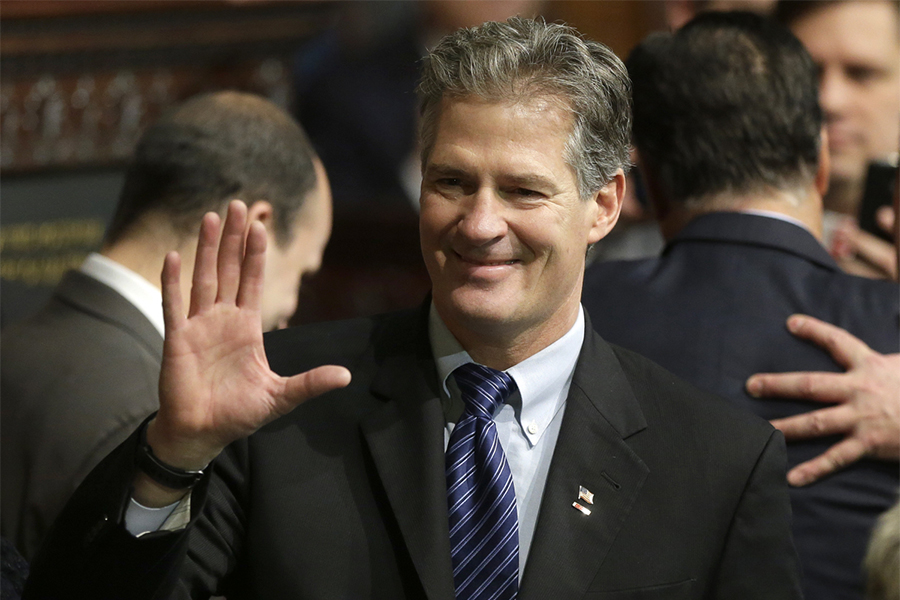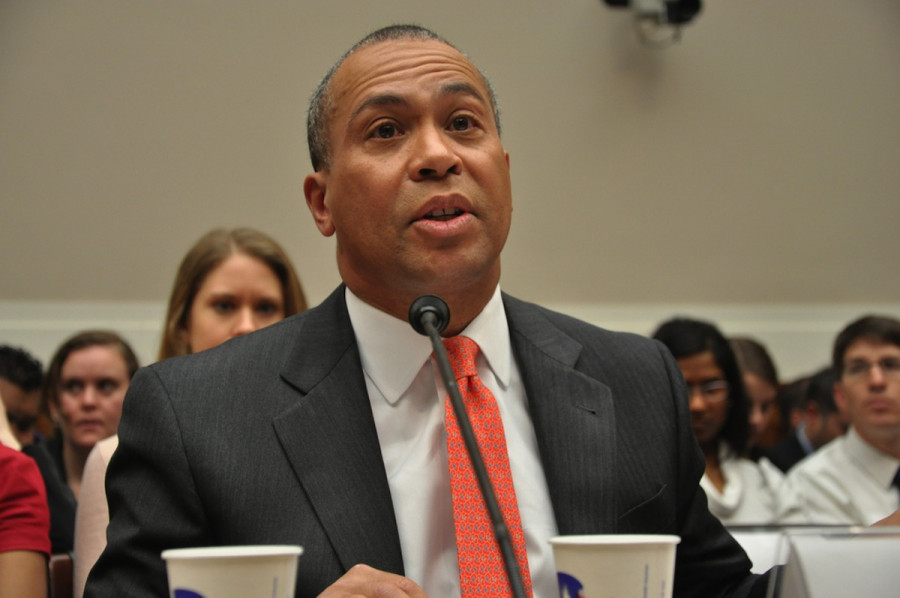A Year in Review: The Most Memorable Stories of 2010
The decade started off with a dark turn.
Tragedy Strikes Haiti
The year started on a terrible note. On January 10, a 7.0 magnitude earthquake struck the country of Haiti, displacing 1.5 million people and causing billions of dollars in damage. It was a horrific tragedy, with a CNN estimate from 2013 putting the death toll at anywhere between 220,000-300,000 people. In Boston, long a home for Haitian immigrants, the reaction was swift. Mass General sent nearly 100 people in the month after the earthquake to lend assistance, and donations poured in across the state. But the longest term effect might have been the thousands of displaced Haitians who ended up settling in Boston under temporary protected status. Years later, the Trump administration’s efforts to rescind that status for Haitians means many long-term Boston residents now face an uncertain future in the city they’ve chosen to call home.

Photo via AP Photo/Steven Senne, File
Scott Brown Beats Martha Coakley
Will liberal Massachusetts ever grow out of its yearning for moderate Republicans? It certainly hadn’t in 2010, when it ushered Scott Brown into the so-called Kennedy seat after Ted passed away. Opponent Martha Coakley made a number of gaffes during the campaign, including expressing disdain for the idea of campaigning outside Fenway Park in the cold, and Brown coasted to victory. He made quick work of his time in the Senate, doing his part to gum up passage of the ACA and earning himself a Jon Hamm portrayal on Saturday Night Live, before being booted out of the Senate two years later by the juggernaut that was Elizabeth Warren’s political career.
The Americans, but Set It in Cambridge
Years before that whole Russia-gate situation brought Russian interference in American politics roaring back into the public eye, the nation was shocked by the revelation that Russian spies were still living among us, doing Russian spy things. “Donald Howard Heathfield” and “Tracey Lee Ann Foley” presented themselves as Canadian citizens and dwelled quietly in Cambridge until their sudden arrest in July of 2010, when they were revealed to be Andrei Bezrukov and Yelena Vavilova. They even had two sons together while living in the States. Their story ultimately inspired the acclaimed 2013 TV show, The Americans, although creator Joe Weisberg decided to set his program in the ’80s. It just seemed too unrealistic that they’d be living here in 2010, you know?
The End of the Craigslist Killer Case
It was a case that drew national attention for its brutality, and for its randomness. In 2009, Philip Markoff, a BU medical student, was charged with killing a woman, Julissa Brisman, who he’d hired as a masseuse through Craigslist. He was arrested after police released footage of him caught on security cameras at the Marriott Copley Place, where the crime had taken place. Further investigation seemed likely to tie him to a series of similar crimes, where women who’d been contacted on Craigslist were the victims of robberies at local hotels. The whole thing was as baffling as it was upsetting—Markoff was engaged, and on his way to becoming a doctor. What in the world had happened? His eventual suicide at the Nashua Street Jail on August 15, 2010 meant that the answers were limited.

Photo via AP
Deval Patrick Beats the Odds
The lessons of 2010 might offer a useful primer for Patrick’s current long-shot presidential bid (or not). Though he was the incumbent at the time, he trailed in the polls against Charlie Baker, and there was every reason to think Republicans would manage a clean sweep in mid-term elections. But Patrick has near-legendary campaigning skills—the man could sell water to a fish. Against the odds, he battled back to win a second term, leaving him sandwiched between a long run of moderate Republican governors, from Bill Weld (now technically a presidential opponent) to Mitt Romney to Charlie Baker. Can’t remember how bad it was? Revisit our 2009 profile of Patrick as he stared down a tough reelection bid.
An Iconic Judge Retires
It’s rare that any of us can say we got our names in the history books, but Margaret Marshall actually did it twice. She was the first female chief justice on the Massachusetts Supreme Judicial Court, and oh yeah, she presided over a little case called Goodridge vs. Department of Public Health, which legalized gay marriage in Mass. a full nine years before it was legalized across the country. The 2006 Goodridge ruling was a historic win for LGBTQ rights, and the 4-3 ruling by the SJC paved the way for future victories. On July 21, 2010, Marshall announced she would be stepping down, in part to spend more time with her husband, who was ill with Parkinson’s, thus ending a storied career on the court that also involved cases upholding the rights of Wal-Mart employees and victims of abuse by the Catholic church.
A Tragic Teen Bullying Crisis Occurs
The details of the Phoebe Prince case were awful—Prince was a 14-year-old Irish immigrant going to school in South Hadley who was bullied relentlessly until her eventual suicide. It’s all the more harrowing in light of the recent bullying/suicide case that made headlines here in Boston. Why does this keep happening? Why haven’t we figured out how to get help to bullied young people in time? In the case of Prince, there seem to have been plenty of issues that exacerbated the situation, including a school district that wasn’t prepared to handle any of the complexities bullying involves, such as the reluctance of victims to come forward. Reread Alyssa Giacobbe’s 2010 piece about the case for the story of the immediate aftermath. She also revisited the story for our upcoming January issue.
The MFA Expands
Swinging by the Museum of Fine Art’s Art of the Americas wing feels pretty commonplace now, which makes it easy to forget that, prior to 2010, it didn’t exist. The glossy new wing opened late in 2010, and earned extensive praise from no less an authority than the New York Times, which called it “almost a double wow.” We’re still blushing from this almost-rave! Per Matthew Reed Baker’s story on the grand opening, the new wing came about courtesy of a seven year fundraising drive that raised half a billion dollars, more than it took to construct Gillette Stadium and the pricey Newton North High School combined. In the years since, you’ve probably seen a plethora of exhibits there, from a Gordon Parks retrospective to the recent Frida Kahlo display. But possibly you just like swinging by to say cheers to Paul Revere.

Photo via AP Photo/Paul Sakuma
The Social Network Solidifies the Myth of Zuck
Remember when everyone got really mad at Mark Zuckerberg? No, the OTHER time. Back in 2010, a splashy new adaptation of Ben Mezrich’s The Accidental Billionaires premiered to rave reviews. Scripted by Aaron Sorkin, directed by David Fincher, and starring Jesse Eisenberg as a sullen, burningly ambitious Harvard-era Zuck, the movie painted a picture of a young man possessed by a need for stature. The image of Zuckerberg as someone willing to stab people in the back on the way to the top endured, and he’s had more or less constant PR problems in the years since. Whether that was a fair portrayal of the young CEO or not, the movie did gift us one of the all-time great putdowns, delivered by Rooney Mara as she dumped a college-age Zuckerberg: “You’re going to go through life thinking that girls don’t like you because you’re a nerd. And I want you to know, from the bottom of my heart, that that won’t be true. It’ll be because you’re an asshole.”
Curt Schilling’s Video Game Saga Takes Its First Twist
At this point, Curt Schilling has lived about a dozen lives in the public eye here in Boston, from World Series hero to Trump-loving right wing politics guy. But surely one of the lower points of his time in the area was the ill-fated 38 Studios, his misguided effort to create his own video company. The project ended disastrously, with the company shutting down and ending up under federal and state investigation. But 2010 was the year it all could have gone very differently: The company, then based in Maynard, was the lucky recipient of a mega-million dollar grant from then-governor of Rhode Island, Donald Carcieri. To relive the not-so-glorious days of what happened next, be sure to revisit “End Game,” our 2010 feature about the whole thing.


